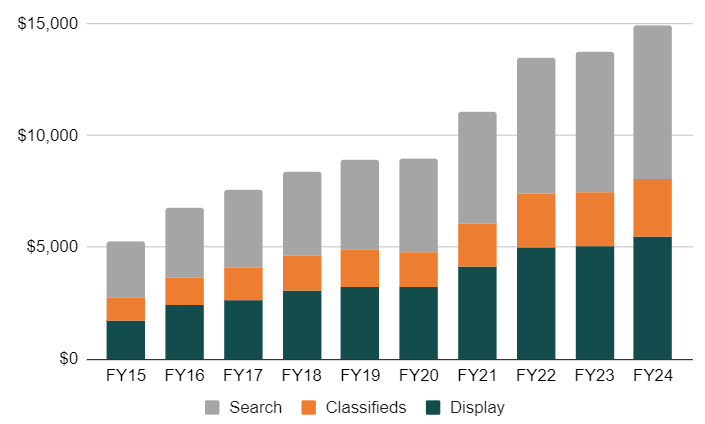BRIEF: Digital advertising growth highlights platform dominance
- Publisher : Venture Insights
- Publish Date : September 6, 2024

Abstract: The Internet Advertising Bureau (IAB) Australia published data on digital advertising spend this week. The full year figures show strong digital ad growth, led by search and display. This data will be ammunition for those pushing the federal Government to enforce the news bargaining code, and rein in platform economic power more generally.
Digital advertising surges in FY24
This week the IAB Australia published its regular data on digital advertising spend in Australia. The results were impressive, particularly in the context of sluggish economic growth. Excluding BVOD (which we attribute to the TV rather than the digital ad industry), advertising spend grew 8.6% overall to reach $14.9bn. Growth was led by search and display at 10.1% and 9.2% respectively, which reached $6.9bn and $5.5bn.
Display’s growth was dominated by video. If we include BVOD in the total, video advertising grew 18.6% year on year to reach $4.1bn. In contrast, non-video display fell by 1.1% year on year to $2.0bn. In good news for the television industry, connected TV continued to yield the greatest share of content publishers’ video inventory expenditure, increasing to 55% (up from 47%), with both mobile and desktop expenditure decreasing. The TV set is increasingly the main battleground for display advertising.
Figure 1: Australia digital ad spend by category (excludes BVOD)

Source: IAB Australia, Venture Insights analysis
This is a stark contrast with traditional media , who are still suffering revenue declines from a slow economy
Why does this matter?
In its long-running 2017-2019 Platforms Inquiry, the Australian Competition and Consumer Commission (ACCC) documented the extent of platform economic power in the advertising sector. Strong vertical integration, network economies, and economies of scale have combined to entrench leading platforms like Google and Facebook in the advertising market.
This is currently playing out in the conflict over the news bargaining code. Meta’s announcement that it will not renew its compensation agreements with news providers is bad news for news & current affairs reporting in Australia. (see our brief “Meta stoush is just the opening salvo”). Google has taken a more conciliatory approach, but has shortened the term of new agreements as it waits to see if the Government will declare Meta under the code, forcing it into arbitration.
News publishers can only see the success of digital advertising as a provocation, at a time when traditional media is suffering from declining revenue and Meta is resisting their claims to compensation under the Code. It will be very difficult for Meta to argue that digital advertisers can’t afford it (though that’s not the issue at stake)!
Meta’s intransigence is also a direct challenge to the Australian Government’s wider attempts to rein in the market power of global platforms. If the Government fails to enforce its News Media Bargaining Code, then the stakes are raised for future regulation of matters like online mis- and disinformation and platform dominance of the advertising market.
About Venture Insights
Venture Insights is an independent company providing research services to companies across the media, telco and tech sectors in Australia, New Zealand, and Europe.
For more information go to ventureinsights.com.au or contact us at contact@ventureinsights.com.au.
